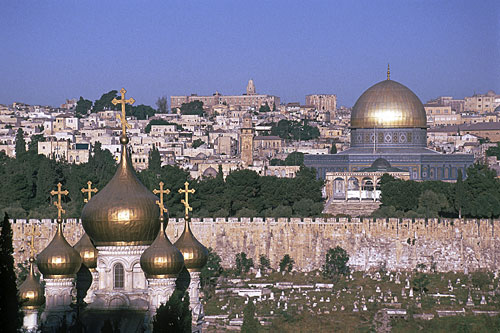Israel-Palestine Feature: Jerusalem's "Extreme Makeover" & "Perilous Decline" (International Crisis Group)
 The International Crisis Group publishes a pair of reports warning of conflict and decline in Jerusalem amid the expansion of Israeli settlements on Paliestinian territory:
The International Crisis Group publishes a pair of reports warning of conflict and decline in Jerusalem amid the expansion of Israeli settlements on Paliestinian territory:
The announcement of significant new Israeli settlement construction in East Jerusalem has put the spotlight on the city, but the changes it has undergone since 2000, when the parties first negotiated its fate, are far broader and have far deeper roots. Israelis, Palestinians and the international community must adjust their strategies accordingly, or Arab East Jerusalem will continue its perilous decline, with catastrophic consequences for all....
A pair of companion reports from the International Crisis Group describes how East Jerusalem has been altered in recent years, physically, but also socially, politically and emotionally. Extreme Makeover? (I): Israel’s Politics of Land and Faith in East Jerusalem, shows how the combination of Israeli settlement construction around and within East Jerusalem and increased religious activism has raised the costs of any future plan entailing partitioning the city. Extreme Makeover? (II): The Withering of Arab Jerusalem describes how Arab neighbourhoods have wasted away under occupation, disempowered and isolated from the Palestinian body politic as rarely before.
Since Yasser Arafat and Ehud Barak negotiated unsuccessfully on Jerusalem’s status in 2000, the city has experienced deep changes at three distinct levels. At the territorial level, settlements have expanded across the core and periphery of East Jerusalem; they now are on the verge of extending a Jewish continuum from west to east across the entire municipality and beyond – potentially delivering a fatal blow to the two-state solution. In the south, construction of new Jewish settlements threatens to all but envelope certain Arab neighbourhoods. Recent announcements by the Israeli government in response to the Palestinians’ successful bid for a limited upgrade of their status at the UN are particularly alarming in this regard.
Secondly, at the religious level, competing claims to the city and especially to the Holy Esplanade – by both Jewish and Palestinian constituencies – have intensified, making some of the compromises mooted in the past seem increasingly irrelevant. This is all the more significant given the rise of the Muslim Brotherhood across the region, which almost certainly will make it more difficult for Arab leaders to endorse solutions that opponents can denounce as inconsistent with Islamic principles.
Thirdly, at the political level, Palestinian Jerusalemites increasingly are adrift, bereft of representation and lacking resources. East Jerusalem has become a rough and angry place, more and more disconnected from its West Bank hinterland. The default Palestinian strategy since 1967 has been to boycott all voluntary contact with the city’s Israeli administration. This, along with the Oslo Accord’s enforced separation of East Jerusalem from the Palestinian Authority, has resulted in crowded and under-served neighbourhoods, with badly outdated infrastructure and in which Palestinian political life has been virtually eradicated.
 International Crisis Group,
International Crisis Group,  Israel,
Israel,  Jerusalem,
Jerusalem,  Palestine
Palestine 
Reader Comments